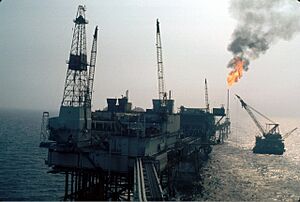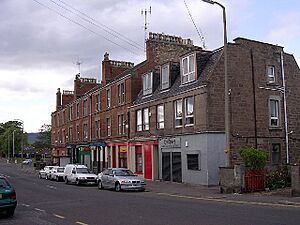Labour Party of Scotland facts for kids
Quick facts for kids
Labour Party of Scotland
|
|
|---|---|
| Founded | Early 1970s |
| Dissolved | 24 May 1973 |
| Headquarters | Dundee, Scotland |
| Ideology | Labourism Scottish nationalism |
| Political position | Left-wing |
The Labour Party of Scotland was a small political group in Scotland during the early 1970s. It was a Scottish nationalist party. This group started when some members left the Scottish National Party (SNP) in Dundee.
The party was known for taking part in the Dundee East by-election in 1973. Their involvement split the votes for nationalist parties. This probably stopped the SNP from winning a seat in Parliament. The party also ran in the Dundee City Council elections a few months later. But they did not win any seats.
The Labour Party of Scotland soon closed down. By early 1974, most of its members went back to the SNP. The SNP was becoming very popular with its campaigns about North Sea oil. The Labour Party of Scotland never had any official members elected to government.
William Wolfe, who was the leader of the SNP at the time, said the Labour Party of Scotland was formed by local politicians just trying to get ahead. One of its most popular members was George MacLean. He ran against Gordon Wilson in the by-election. Gordon Wilson later became the leader of the SNP in 1979.
Contents
History of the Party
How the Party Started
This party was created by unhappy members of the Scottish National Party (SNP) in Dundee. They broke away from the SNP in the early 1970s. William Wolfe, the SNP leader, believed the split was not about different ideas. He thought the new group's leaders just wanted to boost their own political careers.
However, historian Peter Lynch described this small party as more radical than the SNP. It was generally left-wing and strongly supported the labour movement in Scotland. This is why it had "Labour" in its name. The party copied another group formed in Glasgow in 1971. That group was also called the "Labour Party of Scotland". But the Glasgow group soon refused to be linked with the Dundee group. Even so, the Dundee party grew its organization and rented office space.
The By-election Campaign
Unlike the Glasgow group, which only ran in local council elections, the Dundee party aimed for a seat in the UK Parliament. In January 1973, George Thomson left his seat in Dundee East. He became a European Commissioner. This led to a special election two months later.
The Labour Party of Scotland chose George MacLean as their candidate. He ran against Labour's George Machin, the SNP's Gordon Wilson, and Conservative candidate William Fitzgerald. William Fitzgerald was then the Lord Provost of Dundee. Nathaniel Gordon of the Liberal Party also ran. He even got Jeremy Thorpe, a famous politician, to visit Dundee during his campaign.
It was a very close election. George Machin won the seat for Labour. He had a majority of 1,141 votes. Labour's share of the votes went down by 15.6%. This was mainly because the SNP did very well, increasing its votes by 21.2%. The SNP's campaign focused on keeping North Sea oil in Scotland to help people in cities. A similar idea helped the SNP win the Glasgow Govan by-election later that year. This election sent Margo MacDonald to the House of Commons.
Political expert David Boothroyd believes the Labour Party of Scotland's involvement in the Dundee by-election stopped the SNP from winning. This was because it split the nationalist vote. George MacLean received 1,409 votes. This was more than the 1,141-vote difference between Machin and the SNP's Gordon Wilson. Boothroyd also thought that voters might not have clearly understood where the Labour Party of Scotland came from. Still, the SNP's strong performance in both 1973 by-elections set the stage for their "It's Scotland's oil" campaign. This campaign is now famous for explaining why the SNP believes Scotland should be independent.
Council Election and End of the Party
On May 2, 1973, elections for Dundee City Council took place. The Labour Party of Scotland had nine candidates running in eight of Dundee's 12 areas. George MacLean ran in the Downfield area. He got the party's best result, with 242 votes and 6.1% of the total. D. McGarry, one of two party candidates in Camperdown, had the lowest result. He got 123 votes, which was 1.6%.
None of the party's candidates won. This led to the party quietly closing down 22 days later. This decision was made along with the Glasgow party, which had not been linked before. They wanted the "national movement to show a united front." Commentators Andrew Murray Scott and Iain MacLeay simply said, "Neither group was successful." The party was dissolved by a vote of seven to one. Most of its members then went back to the SNP. Some even helped with the SNP's pirate radio station, Radio Free Scotland.
Without the small Dundee group, Gordon Wilson became a Member of Parliament for Dundee East in the general election of February 1974. He also served as the SNP's Deputy Leader at the same time. Wilson later became the leader of the SNP from 1979 to 1990, taking over from William Wolfe.
Election Results
UK Parliament Elections

| 1973 Dundee East by-election | |||||
|---|---|---|---|---|---|
| Party | Candidate | Votes | % | ±% | |
| Labour | George Machin | 14,411 | 32.74 | -15.60 | |
| SNP | Gordon Wilson | 13,270 | 30.15 | +21.22 | |
| Conservative | William Fitzgerald | 11,089 | 25.19 | -17.17 | |
| Liberal | Nathaniel Gordon | 3,653 | 8.30 | N/A | |
| Labour Party of Scotland | George MacLean | 1,409 | 3.20 | N/A | |
| Independent | John S. Thomson | 182 | 0.41 | N/A | |
| Majority | 1,141 | 2.59 | -3.39 | ||
| Turnout | 44,014 | 70.0 | -5.97 | ||
| Labour hold | Swing | -18.41 | |||
Local Government Elections
| Ward | Candidate | No. of votes | % of vote | Outcome |
|---|---|---|---|---|
| Caird | J. Fairweather | 134 | 3.5 | Defeated |
| Camperdown | I. M. Donaldson | 227 | 3.0 | Defeated |
| Camperdown | D. McGarry | 123 | 1.6 | Defeated |
| Craigie | G. McKenzie | 209 | 4.6 | Defeated |
| Douglas | H. Dunning | 94 | 2.0 | Defeated |
| Downfield | G. MacLean | 242 | 6.1 | Defeated |
| Harbour | L. MacQueen | 81 | 2.8 | Defeated |
| Hilltown | J. Alexander | 57 | 2.6 | Defeated |
| Lochee | D. McTaggart | 112 | 2.3 | Defeated |
 | William M. Jackson |
 | Juan E. Gilbert |
 | Neil deGrasse Tyson |


